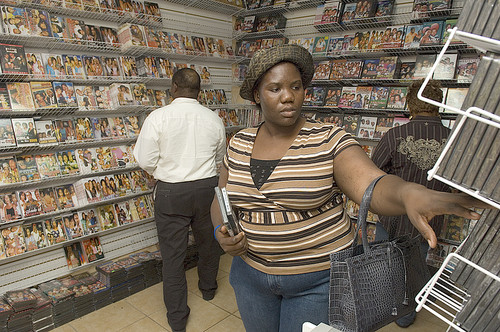


Posted by By Georgia East on



They've never walked along the dusty roads of Lagos, Nigeria, or set foot in an extravagant mansion in Ghana.
They've never walked along the dusty roads of Lagos, Nigeria, or set foot in an extravagant mansion in Ghana.
But fans of African movies now being sold in South Florida say they find themselves glued to their screens because in so many ways, the faraway continent feels so familiar.
"It's everything from the drapes hanging at the entrance door in the kitchen to the way people go down on their knees before saying good morning to their elders," said Hermante Leonard, who sees similarities to her Haitian culture in the movies.
Despite mediocre sound quality and a lack of special effects, Nigerian films are growing in popularity in South Florida, especially among Caribbean natives. In strip plazas in Lauderdale Lakes, Miramar, West Palm Beach and North Miami, vendors who used to specialize in movies from Jamaica and Haiti said they've recently switched their focus to African films because of the demand.
"These movies are entertaining," said Fay Bailey, a retired nurse from Jamaica. "They showcase the beauty and strength in Africa, and there's more laughter than anything."
Fans say they help satisfy a need here, where mainstream films starring black performers are few and far between. They like the intelligent dialogue, relative absence of nudity and the prominence given to areas of Nigeria and Ghana not usually seen on Western television.
The Nigerian film industry, often referred to as "Nollywood," churns out about 1,500 new movies a year, making it the third largest in the world, after Hollywood and India. Industry analysts estimate it grossed $286 million last year, compared with $2 billion brought in by Indian films.
African movies are performed in English with story lines that center on infidelity, family cohesiveness, folklore and spirituality. Unlike Hollywood blockbusters, however, these films are usually made on a shoestring budget of about $20,000, and sell here for about $10.
Caminito Rose, who is originally from Haiti, began selling the movies about four months ago in his North Miami store, Lionel Productions African Movie Mall.
He said on an average Saturday he sells about 400 Nigerian movies.
Fans say it's not the price but the story lines that keep them wanting more.
Hopeton Green, of Lauderdale Lakes, said he buys them because "the backgrounds reminded me so much of Jamaica. The way the people dressed, their demeanor. The accent was the only thing that really marked the difference."
Leonard said she became hooked after watching Blood Sisters, about a bad sister trying to destroy the good sister's life.
So about a year ago, she started selling the movies at her music stores, Se Mizik Lakay, in Lauderdale Lakes and Oakland Park.
Other retailers say their clients introduced them to the films.
"I started selling them about two months ago because people came to me and asked me for certain titles," said Jerome Altidort, manager at VS Music Store, in West Palm Beach, which specializes in Haitian music and movies.
Nigeria's movie industry got its start in the early 1990s, when Nigeria was undergoing a financial crisis and foreign films were scarce.
Experts say violence at that time kept many Nigerians from going to local theaters.
To fill the void, local directors began filming with hand-held cameras and producing movies on a shoestring budget. The video films, as they're called, often have sequels and, in some cases, up to four or five parts.
Some movie watchers say they block out time to watch the films, which are usually about three hours long, because once they get into Part 1, it's difficult not to watch the sequel.
"I know it sounds [like a] cliche, but you really feel like you're experiencing your roots," said Opal Brown, of Pembroke Pines.
Industry specialists say easier access to the films is increasing their popularity, especially in New York City, Washington, D.C., and South Florida.
"The distributors of these video films don't have to rely on a huge marketing strategy," said Onookome Okome, author of the upcoming book Nollywood: Cinema, Culture, Society.
But piracy is also a big issue and local retailers say it's hard to compete with the copiers who sell at rock-bottom prices.
"I used to have a lot more customers, but the piracy is slowing things down," Leonard said.
Back at African Movie Mall, patrons Fay Bailey and Cherley Sanon are debating which story lines are more intriguing.
Sanon, who is Haitian, watched her first Nigerian film about three months ago in a hair salon.
She now has 20 titles and said she likes the movies that show off the affluent Nigerian neighborhoods.
Not so for Bailey, who countered, "I like the movies that bring me right into the villages."

